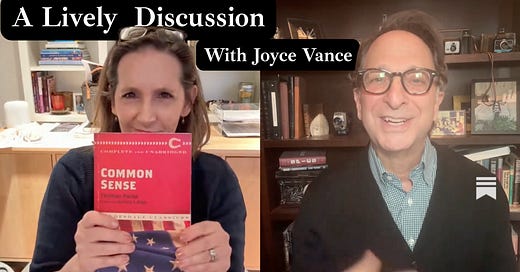This was so much fun to do. A great conversation on a late Saturday afternoon with Joyce. We discuss her new book, how we met, and of course our dogs Bella, Elsa, and Innis. In short, a wonderful Saturday afternoon get together.
Hope you enjoy it as much as we did. (For readers, a transcript of the conversation is below.)
–Andrew
TRANSCRIPT
Joyce Vance:
Andrew and I were reminiscing about when we first met, and we thought we’d share that story with you.
It’s great to see so many of you signing on from all over the country.
Andrew was the brand-new General Counsel of the FBI, working for Bob Mueller, and I was still a relatively new U.S. Attorney from North Alabama. I chaired the Criminal Practice Subcommittee of the Attorney General’s Advisory Committee.
My boss, Eric Holder, had given me the job of convincing the FBI to start videotaping custodial statements made by defendants after arrest. That might sound straightforward, but it was actually hugely disruptive for law enforcement. A U.S. Attorney out West had even been fired for trying to implement this during the Bush administration.
Andrew’s predecessor, Judge Caproni, and I had a great relationship. She understood why it was important to get these statements on tape, but there was still a lot of resistance. It was difficult for line agents—it required technology, and even Andrew and I struggled just signing on to this Substack Live! Asking agents to figure out how to videotape these statements after an arrest was a tough sell. Many agents simply said, “This isn’t happening. We can’t do it.”
Andrew Weissmann:
You’re absolutely right. The big picture here was about finding alignment. We had separate interests and concerns, but we worked to understand what each other was trying to accomplish. Nobody got exactly what they wanted, but it was a productive process.
I remember thinking at the time, “I really like this person.” And honestly, that goes a long way. When you’re having a dispute, it’s much easier to find common ground when you respect and like the person you’re working with. It helps you agree to disagree respectfully.
This moment feels like the perfect precursor to today. It’s kind of like the marriage of two Substacks. Yours is this grand dame—no offense—and mine is this little starter Substack.
Joyce Vance:
I actually had the benefit of starting a Substack early, and it happened in a weird way. I was spending a weekend in New York with two of my close friends—my knitting buddies—Mary Trump and E. Jean Carroll. We all live in this strange world, right?
We were at Mary’s place, and they both said, “We’re writing Substacks. You need to do this.” And I thought, “I don’t want to write a Substack.” But it turned out to be an interesting journey.
I love that you’ve started one now. Your voice is unique and remarkable. Let me just embarrass you for a moment. Hearing your insights, especially with your institutional knowledge of both the FBI and the Justice Department, really matters right now. It’s incredibly important. So thank you for taking it on—I know how much work it is!
Andrew Weissmann:
Totally. And just so everyone knows, we’re going to wrap up the Andrew Weissmann section of this talk.
But Joyce, I wanted to have this conversation because I recently got an announcement from you that you’re writing a book, and I had so many questions! As a lawyer, I was thinking, “I want to read it now!” But let’s take it step by step.
Joyce Vance:
I’m not sure I’m ready to let the former General Counsel of the FBI interrogate me. That feels dangerous!
Andrew Weissmann:
Welcome to being one of my friends! I’m not the kind of person you want at dinner parties—I have 47 questions, most of them compound, and there might be a test at the end.
But seriously, what’s the book about? What led you to write it? Do you have a working title, and when can we expect to read it?
Joyce Vance:
I didn’t start writing it in the traditional way. Usually, you write a book proposal, send it to publishing houses, and see who bites. But the week after Thanksgiving, I got an email from someone at Penguin Random House. He’d read my column, Giving Up is Unforgivable, and asked if I’d write a book based on it.
Andrew Weissmann:
Random House—that’s my publisher too!
Joyce Vance:
Exactly! I’m still learning about publishing, but my book is with the main part of Random House. Their editors were incredible, constantly encouraging me to go deeper—asking how I felt during key moments, what I was thinking. As a lawyer, that was a challenge because I’m used to focusing on facts and outcomes, not emotions.
Andrew Weissmann:
Right, like going to court and saying, “Judge, I read the Brady v. Maryland decision over a cup of Earl Grey.” The judge would look at you like you’d lost your mind!
Joyce Vance:
Exactly! But honestly, I’d read a book about what kind of tea you all drank during the Mueller investigation.
Andrew Weissmann:
So, what made you say yes to writing the book?
Joyce Vance:
It was a moment of weakness—but also clarity. After the election, people were devastated. I kept hearing, “I give up. I can’t do this anymore.” But for me, giving up wasn’t an option. We knew what was coming. We’d read Project 2025. We had to fight.
The book is about finding the courage to keep going, even when you feel beaten back. There are powerful lessons from history, law, and literature about perseverance. Joe Biden likes to say, “This is the United States of America,” and that means we don’t give up when times are tough.
Andrew Weissmann:
I had a similar moment with Loretta Lynch, the former Attorney General. She reminded me that progress isn’t linear. The fight for justice takes years—decades, even centuries. And setbacks are inevitable.
Loretta is such a wise person. She didn’t sugarcoat anything but emphasized that persistence is key. It was an important message when I needed it most.
Joyce Vance:
Exactly. That’s why I can’t wait for you to read the book. It’s about finding resilience and strength when it feels easiest to quit. I can’t wait to read it. It sounds like the kind of perspective we all need right now.
Joyce Vance:
Hearing Loretta speak there was incredible, especially as we were about to enter a very different era.
She has this quality—she doesn’t tiptoe around things. She just faces them head-on. She talked about what was coming, the work we’ve done, and how progress isn’t always linear. Then she looked around the church, meeting people’s eyes, and said, “We cannot give up. We have work to do.”
That stayed with me throughout the Trump 1.0 administration, and in many ways, it became the inspiration for my book. I love that woman. You were so lucky to have her as your boss.
Andrew Weissmann:
Oh my God, so lucky. Beyond being a brilliant attorney, the older I get, the more I value people who are grounded and have a strong backbone. They’re the salt of the earth—true models for behavior.
And Joyce, you fit right into that model.
This is going to be the best, but I wanted to ask you about something. When I got the note about your book, we went back and forth, and you mentioned Thomas Paine. You were thinking of him as a historical reference, right?
Joyce Vance:
Yes, exactly.
Andrew Weissmann:
Obviously, there’s Common Sense—right on cue, actually! Here’s my very dog-eared copy. What is it about Paine’s work that resonates with you? How are you thinking about that in terms of the book you’re writing?
Joyce Vance:
Well, first, I have to say—I’m no Thomas Paine. I can’t write like that or think like that, so it feels audacious to draw the comparison.
But what I draw is inspiration. There’s something fascinating about Common Sense. Before Paine wrote it, there wasn’t really a movement for independence. People didn’t have the language to argue for it. Sure, we didn’t want to be taxed without representation, but we weren’t quite ready for revolution.
Paine made the argument in a very civilized, reasoned way—about why independence was right, destined, and appropriate. In modern terms, he “socialized” the idea. And once people read it, it caught on. We know what happened next.
For me, the takeaway is that we’re living in an era where many people believe democracy has failed. There’s this sense that Trump outran the rule of law. But I don’t want to write a Trump book. I want to write about democracy—how to restore it.
We, as Americans, need to reclaim the conversation about democracy. We need to talk about it as something powerful and full of potential, not as something that can be dismantled by one man.
Andrew Weissmann:
Love it. That’s such an important perspective.
And that’s a great segue to my next question—yes, I’m still that dinner guest who asks too many questions!
Joyce Vance:
I didn’t realize this about you! I’m starting to think we should have a bottle of wine next time.
Andrew Weissmann:
Now you’re talking. During COVID, people would ask, “What did you learn? Did you pick up French? Did you practice piano?” And I’d say, “Nope. I learned to drink better.” My wine tolerance went way up!
Joyce Vance:
That’s hilarious. My husband learned how to make mixed drinks. All four of our kids were home, and we had this outdoor fireplace. Couples from our bubble would come over, and we’d all sit six feet apart, socially distanced. Bob learned to make some great drinks.
Andrew Weissmann:
I love the COVID language—“our bubble.” Everyone just gets it. I remember thinking, “Virtual drinks? What?!” But it became second nature. Technology really helped bring people together during that time.
But here’s my real question. We both do law in the media now—explaining things to the public so they can understand legal ramifications. If someone had told me years ago that this is what I’d be doing, I’d have thought they were crazy.
What led you to start doing it? And what keeps you going? What do you think is working, and what could we be doing better?
Joyce Vance:
That’s a great question because it’s pretty much the theme of my book.
When I started writing on Substack, I didn’t have a clear vision. I just figured things would happen, and I’d write about them once or twice a week.
But I’ve always felt an obligation to share what I learned from my 25 years at the Justice Department, eight of those as a U.S. Attorney. I loved that job. Getting to stand up in court and say, “My name is Joyce Vance, and I represent the United States of America,” was a proud moment every time.
It was emotional for me, especially as the grandchild of immigrants. And I wanted to share that perspective—to help others appreciate the justice system the way I did.
But I never imagined it would evolve into writing about two impeachments, four indictments, and posting at a frantic pace—sometimes multiple times a day. There’s still so much people need to know, and that’s why I keep going.
For me, it’s about civics education. Sharing my experience so others can better understand the system. We owe each other that kind of conversation. That’s why my Substack is called Civil Discourse.
Andrew Weissmann:
So much of what you said resonates with me. We were both trial lawyers, and I always believed in respecting jurors. Even though they didn’t know the law, they deserved respect. I never wanted to look down on them.
If I didn’t think a case should be brought, I didn’t belong in the courtroom. My approach was always to explain it rationally—to show them why I believed the case mattered. And more often than not, they got it.
It’s the same with Americans and common sense. People have an incredible amount of it, and they approach their responsibilities—like jury duty—with integrity.
Joyce Vance:
Absolutely.
Andrew Weissmann:
One thing I wanted to mention, though—it’s about healthcare. I come from a family of medical professionals, and I’ve been talking to people about the recent cuts to healthcare funding. The impact on our medical system is concerning.
It’s tough to convey the urgency because research doesn’t give immediate results. But America has been a leader in medicine because of that investment—and the fact that we’re a rule-of-law country where people trust the system.
I’ve been encouraging journalists to write about this so people can better understand what’s at stake.
Joyce Vance:
It’s such an important issue.
Andrew Weissmann:
Okay, now for something lighter—how’s the puppy?
Joyce Vance:
She’s great! We have a 10-week-old German Shepherd named Elsa. We got her because our older Shepherd, Bella, was really sad after we lost our boxer. But really, my husband just wanted a puppy.
He’s never raised one before, so it’s been hilarious watching him figure it out. He’s doing a great job, but my favorite cashmere sweater is a casualty. And one of my L.L. Bean slippers is now perpetually damp from chewing.
Andrew Weissmann:
I thought you were about to say something worse!
Joyce Vance:
No, just chewed-up slippers and knitting yarn. But for a 10-week-old, that’s pretty good. How’s Ennis?
Andrew Weissmann:
He’s 11 and a half, and I hate acknowledging his age. But he’s great, even though I can see him slowing down.
Joyce Vance:
You know, I have a rule—I don’t trust anyone who doesn’t like dogs.
Andrew Weissmann:
Not just fair—it should be a crime! If you don’t like dogs, you shouldn’t be allowed to hold office.
Joyce Vance:
Agreed!
Andrew Weissmann:
Joyce, I promised 15 minutes, and we’re now at 30. Storms are rolling in here, so I think it’s a good time to wrap.
Joyce Vance:
This was so much fun. And I don’t mind your 47 questions—let’s do this again!
Andrew Weissmann:
Absolutely. Stay safe with Bella, Elsa, and Bob.
Joyce Vance:
Thanks, everyone, for joining us! I think we’ll be able to post this after the fact. Have a great weekend!


















Share this post